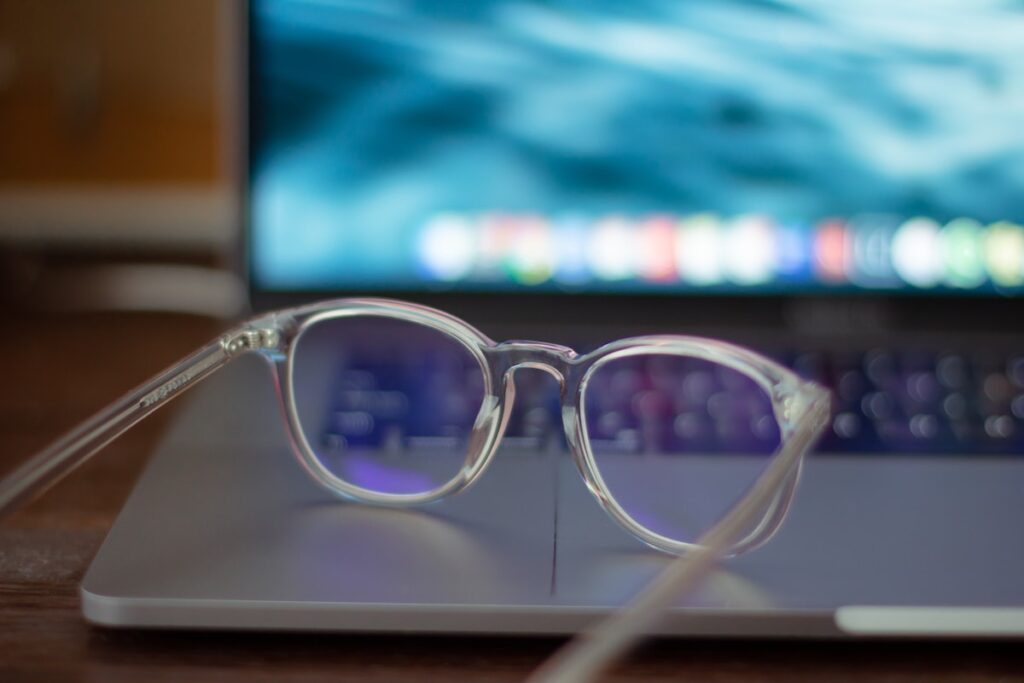In our digital world, many of us spend hours staring at screens for work or leisure. This excessive blue light exposure can lead to eye strain, headaches, and sleep issues. Computer glasses with built-in blue light filters promise to protect your eyes and prevent damage. But do they really work?
In this post, we’ll explore what exactly blue light is, its effects on your eyes and health, and whether these special glasses live up to their claims. I’ll also provide tips on how to choose quality computer eyewear.
What is Blue Light?

First, what exactly is blue light and where does it come from?
- Blue light is a high-energy visible light with short wavelengths on the light spectrum.
- It emanates from digital screens like phones, tablets, and computer monitors, as well as fluorescent and LED lights.
- The sun emits high levels of natural blue light. But excessive artificial exposure can throw off circadian rhythms.
- Blue light wavelengths between 415-455 nm are most likely to penetrate deep into the eye. This can cause oxidative damage over time.
So in summary, blue light comprises one slice of the visible light spectrum. But overexposure from manmade screens may cause issues like:
- Digital eye strain
- Blurry vision
- Dry eyes
- Headaches/migraines
- Circadian rhythm disruption
- Retinal damage
This is where blue light glasses come in! Let’s examine the evidence for their protective benefits.
Do Blue Light Blocking Glasses Work?

Many companies now manufacture computer glasses to filter out blue light. But what does the science say about their effectiveness?
Several studies show blue light glasses can provide measurable benefits:
- Randomized trials found wearing blue light lenses for 3 hours before bed led to significantly better sleep quality compared to placebo lenses.
- Another study discovered blue light glasses helped people fall asleep 18 minutes faster on average versus no glasses.
- Researchers noted participants had less eye fatigue and headaches when wearing blue light blocking glasses while working at a computer.
- Tests confirm quality blue light lenses can filter out up to 90% of harmful blue-violet light depending on coatings.
- One study saw a 68% drop in melatonin suppression when wearing blue light glasses at night versus no glasses. This helps regulate healthy sleep cycles.
However, some eye doctors caution more research is still needed to determine long-term impacts. The jury is out on whether permanently wearing blue light glasses prevents eye disease.
The takeaway – quality blue light blocking glasses can provide immediate benefits like less eye strain and better sleep. But more time is needed to analyze potential long-term protective effects.
How Do Blue Light (Computer Glasses) Glasses Work?
If you decide to give computer eyewear a try, it helps to understand the science behind how they work.
There are a few ways Computer Glasses filter or block blue light:
- Lens coatings – Anti-reflective/blue light-filtering coatings reflect and absorb blue light waves. Popular coatings like Crizal Prevencia can block up to 35% blue light.
- Lens material – Polycarbonate lenses naturally block some blue light due to their composition. Plastic materials like Trivex also offer light blue light protection.
- Lens tints – Adding a yellow, amber, or orange lens tint absorbs more blue light waves that would otherwise enter your eyes. These tinted lenses also reduce glare.
- Lens quality – Higher index lenses with premium anti-reflective coatings filter more blue light and cause less distortion than standard lenses.
So in summary, a combination of lens treatments, materials, tints and coatings contribute to filtering blue light. Higher lens quality equals better protection.
What to Look for in Blue Light Blocking Glasses

If you’re in the market for blue light glasses, keep the following tips in mind:
- Verify the glasses block at least 35% blue light or higher. Some cheap pairs may not provide sufficient filtering.
- Look for premium lens materials and coatings like polycarbonate or Trivex lenses with Crizal Prevencia or Zeiss DuraVision BlueProtect.
- Make sure lenses have no distortion which can actually cause more eye fatigue.
- Consider a subtle yellow, amber, or orange tint rather than a dark tint if you need them for daytime use.
- Get anti-reflective coating to reduce glare. Make sure to keep them clean.
- Ensure the frames fit your face and feel comfortable for long-term wear. Adjustable nose pads help.
- Get your eyes examined first to address any vision issues before trying blue light glasses.
Prioritize premium materials and coatings backed by science. Beware of cheap pairs making unfounded health claims. And make sure to keep resting your eyes every 20 minutes, even with blue light blocking glasses on!
Wrapping Up
Computer Glasses – There is increasing evidence that effective blue light blocking glasses can provide short-term benefits like reducing digital eye strain and improving sleep quality. However, more research is still needed on potential long-term impacts of blue light exposure and prevention.
I recommend giving computer eyewear a try especially if you’re experiencing eye discomfort from extended screen time. Look for quality lens materials, coatings, and a subtle tint. And be sure to take regular screen breaks, use proper lighting, and maintain good sleep hygiene too.







